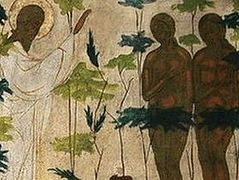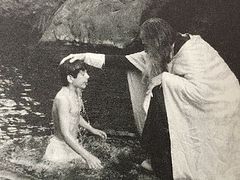The apostle Paul has some words that are to some extent discouraging. He considers that he is a wretched person, and explains why: “I want to do good, but I do evil. I intend to live according to God’s commandments, but I am unable” (cf. Rom. 7). But if we contemplate the words of the apostle, and, of course, we see ourselves in them in certain situations, we should then in fact experience great joy.
Man dies to sin in the Sacrament of Baptism. The grace of God cleanses those sores, that sinful filth which covers his soul. Man is born for a new relationship with God. He is reborn for eternity, ceasing to be a son of fallen Adam and becoming an heir to the Kingdom of God, a descendant of the New Adam. But at the same time the grace of God does not annihilate a man’s freedom or destroy him as a person. Man does not become just a cog in the Body of Christ, but His own living cell. Every Christian, in every aspect of his life, in all his dreams, his desires, in all the beauty of his soul, his talents, and in the gifts of God, is unique. We are all important and dear to God, and everyone has a special, unrepeatable personal relationship with Him. Man’s freedom—the freedom to live, and to not die—is one of the gifts of God.
The apostle Paul speaks to us of the inclination towards sin. Man is often unable to enter into new life because certain sinful habits—restraining factors—prevent him from doing so. But at the same time, man is given this freedom itself—the freedom to create, the freedom to fear, the freedom to not despair, to rise again and move forward, no matter how he fell. In this is the great love of God for every man. If we properly understand freedom—not as lawlessness, not as the ability to do that which we sometimes regard as good for us—but as the freedom to seek God, the freedom to acquire new horizons of relations with God and with our fellow man, then we truly realize ourselves as new creations in Christ. The apostle Paul also writes about it, and in the same Epistle to the Romans there are some delightful words about how we all, baptized into Christ, must die to sin, and Baptism is the point of departure, that disposition, that tenor which is given to man that he might be able to resist sin for the rest of his life; because life does not end with Baptism, but rather begins and unfolds before a man, as a sheet of paper. Man does not see what is written there, what is depicted. At the beginning of the path he cannot understand how it will turn out for him in the end. Only upon reaching the end of the path does man see what he is. But trial and temptation situations reveal what a man truly lives. All gloss, all external masquerades subside, and man sees who he is. And in these situations, of course, the grace of God prompts us, strengthens our powers and directs us when we tire, when we feel haggard, and when our strength dries up.
The Lord so loves us that He does not prevent us from disfiguring ourselves with sin. He waits for man to understand that it’s impossible to live that way, for when he comes to his senses, and when he, armed with the power of God—His grace—gradually begins to dislodge the world from his life and from his heart. After all, this process is not an instant, but an entire life, in which we manifest ourselves as the image of God, as those whom the Lord has entrusted to be His reflection in this world. Therefore, we will not despair and will not grieve, even if it doesn’t work out for us and the devil attacks us. But rather we will see in this great trust on the part of God, Who wants us, all the same, to remain His beloved children, and grow into the full measure of the image of God, becoming His likeness; becoming, as St. Macarius the Great writes, God after God, and that those people who surround us would become the same for us. Then we can truly grow; then we can truly inherit the Heavenly Kingdom, which has already come in power and grace, which nourishes our languishing strength.





